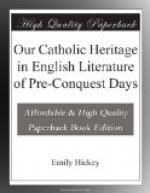To
each of these men
Be hell’s door shut,
heaven’s unclosed,
Eternally opened the kingdom
of angels,
Joy without end, and their
portion appointed
Along with Mary, who takes
into mind
The one most dear of festal
days
Of that rood under heaven.
The poet wrote about the Holy Cross, not just because it was a picturesque subject, capable of picturesque treatment, one that would make a fine poem; but because, as he tells us, Holy Wisdom had revealed to him “wider knowledge through her glorious power over the thoughts of the mind.” He tells us how the fetters of sin had bound him in their bitter bondage, and how, stained and sorrowful, light came to him, and the Mighty King bestowed on him His bountiful grace, and gave him light and liberty, opening his heart and setting free for him the gift of song, that gift which, he says, he has used in the world joyfully and with a good will.
Not once alone, he says, did he meditate upon the Tree of Glory, but over and over again. He thought upon it until all his soul was saturated with it, and hallowed and consecrated for ever.
He may have venerated the Cross in public on the anniversary of the Lord’s Crucifixion. Certainly, many a time he had venerated it in private. Perhaps, like Alcuin, his habit was to bow toward the Cross whenever he saw it, and whisper the prayer “Tuam crucem adoramus, Domine, et Tuam gloriosam recolimus passionem."[G]
[Footnote G: The Veneration of the Cross, or Creeping to the Cross, was known in Anglo-Saxon times, but whether as early as Cynewulf’s day, seems uncertain.]
He was old, he tells us, when he “wove word-craft, made his poem, framing it wondrously, pondering and sifting his thoughts in the night-time.”
The Cross had brought him light and healing, and at the foot of the Cross he laid his gift of song.
It is a moot point whether the “Elene” or the “Dream of the Holy Rood” came first. The poetry of the “Dream” is as fine as the conception is grand, and, at whatever time it was written, it must be classed as being at the high-water mark of the poet’s work.
Wonderful things have been given to us “under the similitude of a dream”; things beautiful and terrible, things wise and strange. There have been Dreamers of Dreams into whose souls have sunk the sight and the hearing of deep things, high things and precious, of comfort and of warning, of sweetest help and of gravest and most earnest exhortation.
The speech of these Dreamers has sounded in our ears, and has left the vibrations to go on and on for our lifetime: this we call remembering.




